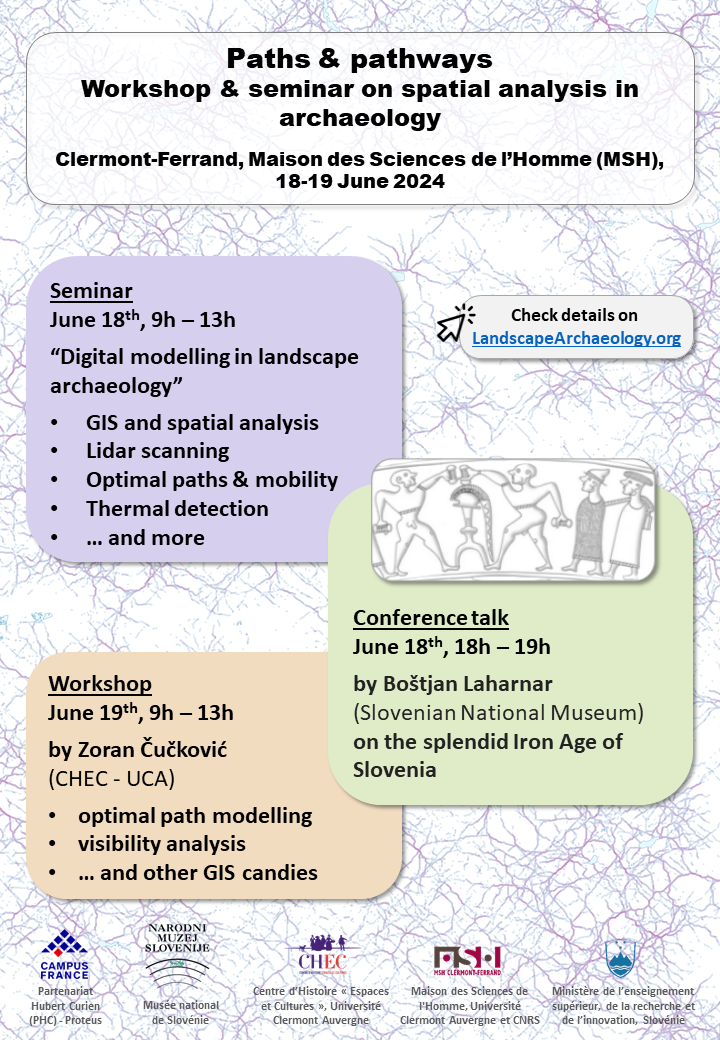This two day workshop and seminar will enable participants to explore and learn on digital approaches in landscape archaeology, with a specific focus on mobility analysis.

Seminar (June 18th, 9h - 13h)
Location: MSH Clermont-Ferrand, salle 332
Programme: to be announced shortly
We will have :
- Matic Zupan (National Museum of Slovenia and University of Ljubljana): Exploring the Iron Age landscape in Central Slovenia through GIS and Spatial Analysis;
- Nejc Dolinar (National Museum of Slovenia): The Ulaka archaeological complex (SW Slovenia) according to ALS data analysis: an attempt on stratification of archaeological features
- Maxime Calbirs (University of Tours, laboratoire CITERES - UMR 7324 ; Équipe LAT) : How can Roman roads be rediscovered in mid-mountain areas? Result of path modelling in the Cantal.
- Elise Fovet (University Clermont Auvergne and CNRS - French National Research Institute): Roman roads of the Auvergne region: remote sensing and digtal modelling
- Zoran Čučković (University Clermont Auvergne, Laboratoire CHEC): New approaches to movement analysis: from paths to total mobility fields
- … and more to come!
Lecture talk (June 18th, 18h - 19h)
Location: MSH Clermont-Ferrand, amphithéatre 219
by Boštjan Laharnar, Head of archaeological departmenet, National Museum of Slovenia
The Dolenjska group as an integral part of the southeastern Alpine Hallstatt culture: Overview and Outline.
Boštjan Laharnar will present us the splendours of Slovenian Iron Age, widely known for its “art of situlae”. Located at the crossroads between the Mediterranean and the Continental Europe, the area of today Slovenia has seen the emergence of hierarchical societites which developped a peculiar lifestyle, borrowing from local and mediteranean traditions.
 Situla from Vače, Slovenia (5th c. BC).
Situla from Vače, Slovenia (5th c. BC).
Workshop (June 19th, 9h - 12h30)
Location: MSH Clermont-Ferrand, salle informatique 26
Topic: This practical workshop will allow participants to learn about GIS mobility modeling (calculation of the optimal path, surface-time, etc.), as well as visibility analysis (landscape impact of structures, intervisibility networks, etc.). We will discuss these approaches through practical case studies, based on archaeological data.
Prerequisites: Familiarity with GIS (data management, undestanding the principle of vector and raster layers). We will use the QGIS software.
Inscription : send me a message / envoyer moi un message via le formularie sur la page “About”.
 …c’est vraiment en anglais ? Eh oui, mais les organisateurs sont tout à fait disponibles pour des traductions/eclaircissements à tout moment.
…c’est vraiment en anglais ? Eh oui, mais les organisateurs sont tout à fait disponibles pour des traductions/eclaircissements à tout moment.
Location
MSH Clermont-Ferrand (show larger map).